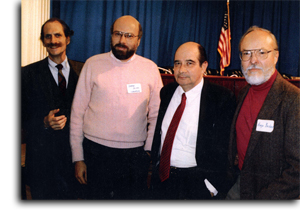The Death Penalty: Law, Litigation, and Social Change
by - September 18, 2013
 The School of Criminal Justice invites you to join us for a special event of the National Death Penalty Archive.
The School of Criminal Justice invites you to join us for a special event of the National Death Penalty Archive.
The Death Penalty: Law, Litigation, and Social Change
Dedication of The Henry Schwarzschild Memorial Collection in the National Death Penalty Archive.
Materials donated by Eugene (Gil) Wanger
Guest Speaker: Professor Michael Meltsner, Northeastern University School of Law
Friday, September 20
4:00 pm - Reception and Group Tours of the Archive
4:30 pm - Dedication and Program*
M.E. Grenander Special Collections and Archives, Science Library
The event is free and open to the public.
* The program will include remarks from Eugene (Gil) Wanger and Professor Michael Meltsner. Discussion and a question & answer session will follow.
Eugene (Gil) Wanger occupies two important places in the history of the anti-death penalty movement. His first contribution came as the young Republican lawyer who wrote the language that made banning the death penalty a part of the Michigan Constitution in 1963. Wanger's second notable contribution comes from his role in preserving the history of the anti-death penalty movement - as a preeminent archivist and collector of historical documents and memorabilia. He also served on the board of the National Coalition to Abolish the Death Penalty (NCADP) for many years and wrote the definitive history of the NCADP for its 30th anniversary in 2006.
As first assistant counsel to the NAACP Legal Defense Fund in the 1960s, Professor Michael Meltsner was a member of the team that designed the anti-capital punishment litigation that led to Furman v. Georgia, the 1972 case in which the Supreme Court decided that capital sentencing laws in force in 39 states amounted to cruel and unusual punishment in violation of the Eighth and Fourteenth Amendments. He represented Muhammad Ali in the case that removed legal barriers to Ali's return to the boxing ring after he refused induction in the Army based on his religious beliefs. Among his other work in the civil rights arena, Meltsner was a principal litigator in the case that led to the integration of southern hospitals. As a professor at Columbia Law School, Meltsner was a co-founder of the school's first poverty law clinic, a program that enhanced law students' education by giving them experience working directly with clients and in the courts. In 1979, he became the dean of the Northeastern Law School in Boston, where he currently is the Matthews Distinguished University Professor of Law. Michael Meltsner has been a Guggenheim Fellow and a Prize Fellow of the American Academy of Berlin. He has served as a consultant to the United States Department of Justice, the Ford Foundation, and the Carnegie Foundation, which sent him to South Africa in 1978 to help set up a law defense fund to advocate against Apartheid. He is the author of five books, including Cruel and Unusual: The Supreme Court and Capital Punishment (Random House, 1973) and a novel, Short Takes (Random House, 1979). Professor Meltsner's remarks will draw on his decades of experience as a civil rights attorney and will focus on: "The Death Penalty: Law, Litigation, and Social Change."
Eugene (Gil) Wanger will donate a portion of his collection of books and records to the National Death Penalty Archive in memory of Henry Schwarzschild. Schwarzschild was a leading death penalty abolitionist between the 1960s and 1990s.
For more information contact Diana Mancini at (518) 442-5210 or dmancini2@albany.edu.
</img>